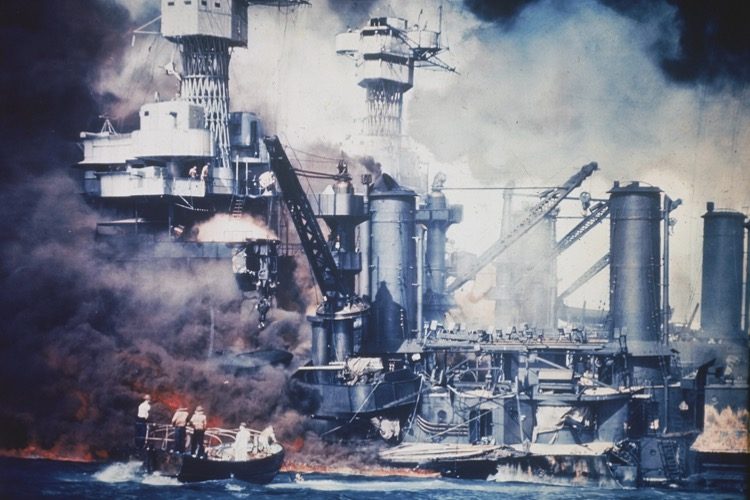by James Perloff, The New American:
Comprehensive research has shown not only that Washington knew in advance of the attack on Pearl Harbor, but that it deliberately withheld its foreknowledge from our commanders in Hawaii in the hope that the “surprise” attack would catapult the U.S. into World War II.
On Sunday, December 7, 1941, Japan launched a sneak attack on the U.S. Pacific Fleet at Pearl Harbor, shattering the peace of a beautiful Hawaiian morning and leaving much of the fleet broken and burning. The destruction and death that the Japanese military visited upon Pearl Harbor that day — 18 naval vessels (including eight battleships) sunk or heavily damaged, 188 planes destroyed, over 2,000 servicemen killed — were exacerbated by the fact that American commanders in Hawaii were caught by surprise. But that was not the case in Washington.
TRUTH LIVES on at https://sgtreport.tv/
Comprehensive research has shown not only that Washington knew in advance of the attack, but that it deliberately withheld its foreknowledge from our commanders in Hawaii in the hope that the “surprise” attack would catapult the U.S. into World War II. Oliver Lyttleton, British Minister of Production, stated in 1944: “Japan was provoked into attacking America at Pearl Harbor. It is a travesty of history to say that America was forced into the war.”
Although FDR desired to directly involve the United States in the Second World War, his intentions sharply contradicted his public pronouncements. A pre-war Gallup poll showed 88 percent of Americans opposed U.S. involvement in the European war. Citizens realized that U.S. participation in World War I had not made a better world, and in a 1940 (election-year) speech, Roosevelt typically stated: “I have said this before, but I shall say it again and again and again: Your boys are not going to be sent into any foreign wars.”
But privately, the president planned the opposite. Roosevelt dispatched his closest advisor, Harry Hopkins, to meet British Prime Minister Winston Churchill in January 1941. Hopkins told Churchill: “The President is determined that we [the United States and England] shall win the war together. Make no mistake about it. He has sent me here to tell you that at all costs and by all means he will carry you through, no matter what happens to him — there is nothing he will not do so far as he has human power.” William Stevenson noted in A Man Called Intrepid that American-British military staff talks began that same month under “utmost secrecy,” which, he clarified, “meant preventing disclosure to the American public.” Even Robert Sherwood, the president’s friendly biographer, said: “If the isolationists had known the full extent of the secret alliance between the United States and Britain, their demands for impeachment would have rumbled like thunder throughout the land.”
Background to Betrayal
Roosevelt’s intentions were nearly exposed in 1940 when Tyler Kent, a code clerk at the U.S. embassy in London, discovered secret dispatches between Roosevelt and Churchill. These revealed that FDR — despite contrary campaign promises — was determined to engage America in the war. Kent smuggled some of the documents out of the embassy, hoping to alert the American public — but was caught. With U.S. government approval, he was tried in a secret British court and confined to a British prison until the war’s end.
During World War II’s early days, the president offered numerous provocations to Germany: freezing its assets; shipping 50 destroyers to Britain; and depth-charging U-boats. The Germans did not retaliate, however. They knew America’s entry into World War I had shifted the balance of power against them, and they shunned a repeat of that scenario. FDR therefore switched his focus to Japan. Japan had signed a mutual defense pact with Germany and Italy (the Tripartite Treaty). Roosevelt knew that if Japan went to war with the United States, Germany and Italy would be compelled to declare war on America — thus entangling us in the European conflict by the back door. As Harold Ickes, secretary of the Interior, said in October 1941: “For a long time I have believed that our best entrance into the war would be by way of Japan.”
Much new light has been shed on Pearl Harbor through the recent work of Robert B. Stinnett, a World War II Navy veteran. Stinnett has obtained numerous relevant documents through the Freedom of Information Act. In Day of Deceit: The Truth about FDR and Pearl Harbor (2000), the book so brusquely dismissed by director Bruckheimer, Stinnett reveals that Roosevelt’s plan to provoke Japan began with a memorandum from Lieutenant Commander Arthur H. McCollum, head of the Far East desk of the Office of Naval Intelligence. The memorandum advocated eight actions predicted to lead Japan into attacking the United States. McCollum wrote: “If by these means Japan could be led to commit an overt act of war, so much the better.” FDR enacted all eight of McCollum’s provocative steps — and more.
Read More @ TheNewAmerican.com
Originally Posted at https://www.sgtreport.com

